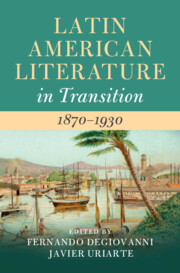Book contents
- Latin American Literature in Transition 1870–1930
- Latin American Literature in Transition
- Latin American Literature in Transition 1870–1930
- Copyright page
- Contents
- Figures
- Contributors
- Acknowledgments
- Introduction
- Part I Commodities
- Part II Networks
- Part III Uprisings
- Part IV Connectors
- Chapter 16 Money
- Chapter 17 Bodies
- Chapter 18 Travel
- Chapter 19 War
- Chapter 20 Science
- Chapter 21 Visual Technologies
- Part V Cities
- Index
- References
Chapter 20 - Science
from Part IV - Connectors
Published online by Cambridge University Press: 14 January 2023
- Latin American Literature in Transition 1870–1930
- Latin American Literature in Transition
- Latin American Literature in Transition 1870–1930
- Copyright page
- Contents
- Figures
- Contributors
- Acknowledgments
- Introduction
- Part I Commodities
- Part II Networks
- Part III Uprisings
- Part IV Connectors
- Chapter 16 Money
- Chapter 17 Bodies
- Chapter 18 Travel
- Chapter 19 War
- Chapter 20 Science
- Chapter 21 Visual Technologies
- Part V Cities
- Index
- References
Summary
Much of the work that has been devoted to Latin American history of science, as well as the analysis of intersections between literature and science in the long nineteenth century, points toward the flawed relationship that this region has had with science and technology. Science encompassed a series of proposals of new ways of seeing; it was a new platform that allowed writers to assume and retain control of their environment. This chapter explores the emergence of popular science magazines in Latin America – publications in which, it is argued, we find literary accounts of science as well as creative accounts of scientific observation. An improved understanding of this vast body of work helps us, in turn, to think of fin-de-siècle Latin American science as representative of what Bruno Latour defines as the “exegesis,” or constant inscription, that represents the central quality and activity of modern scientific life.
- Type
- Chapter
- Information
- Latin American Literature in Transition 1870–1930 , pp. 293 - 306Publisher: Cambridge University PressPrint publication year: 2022

